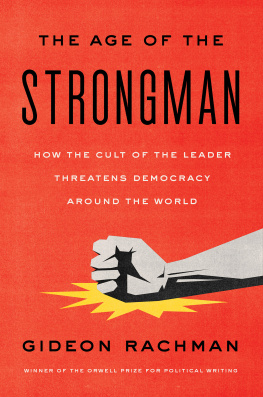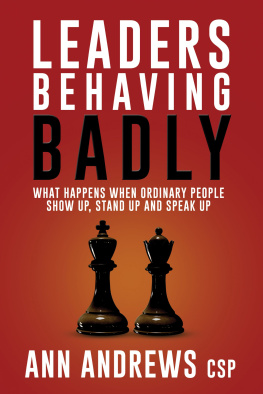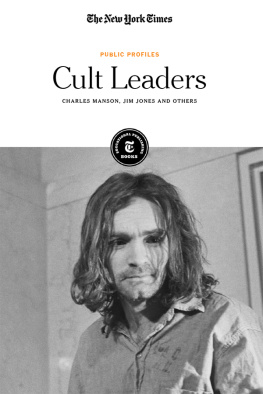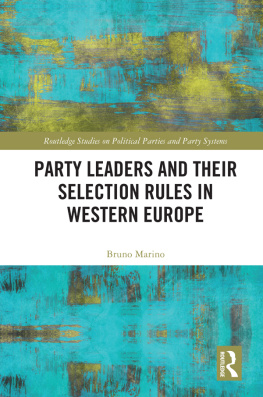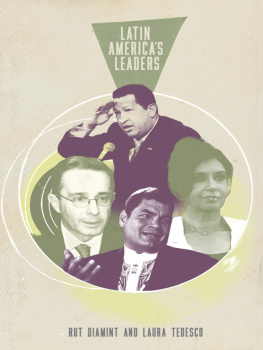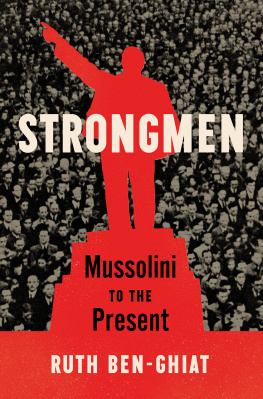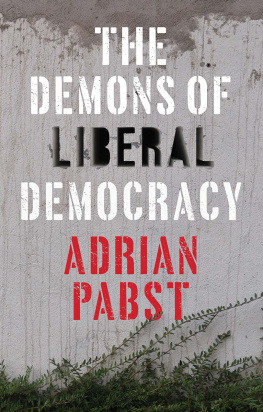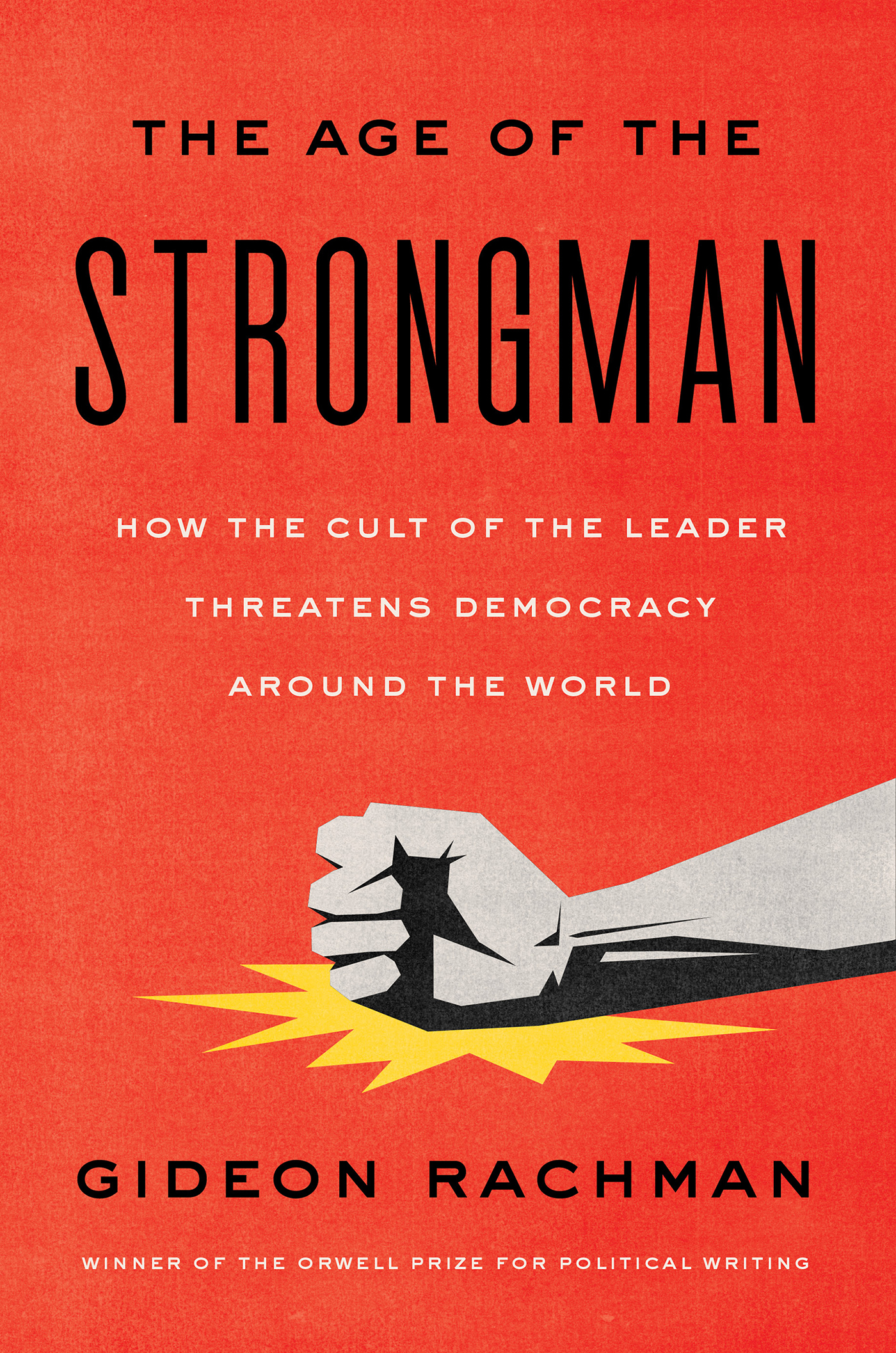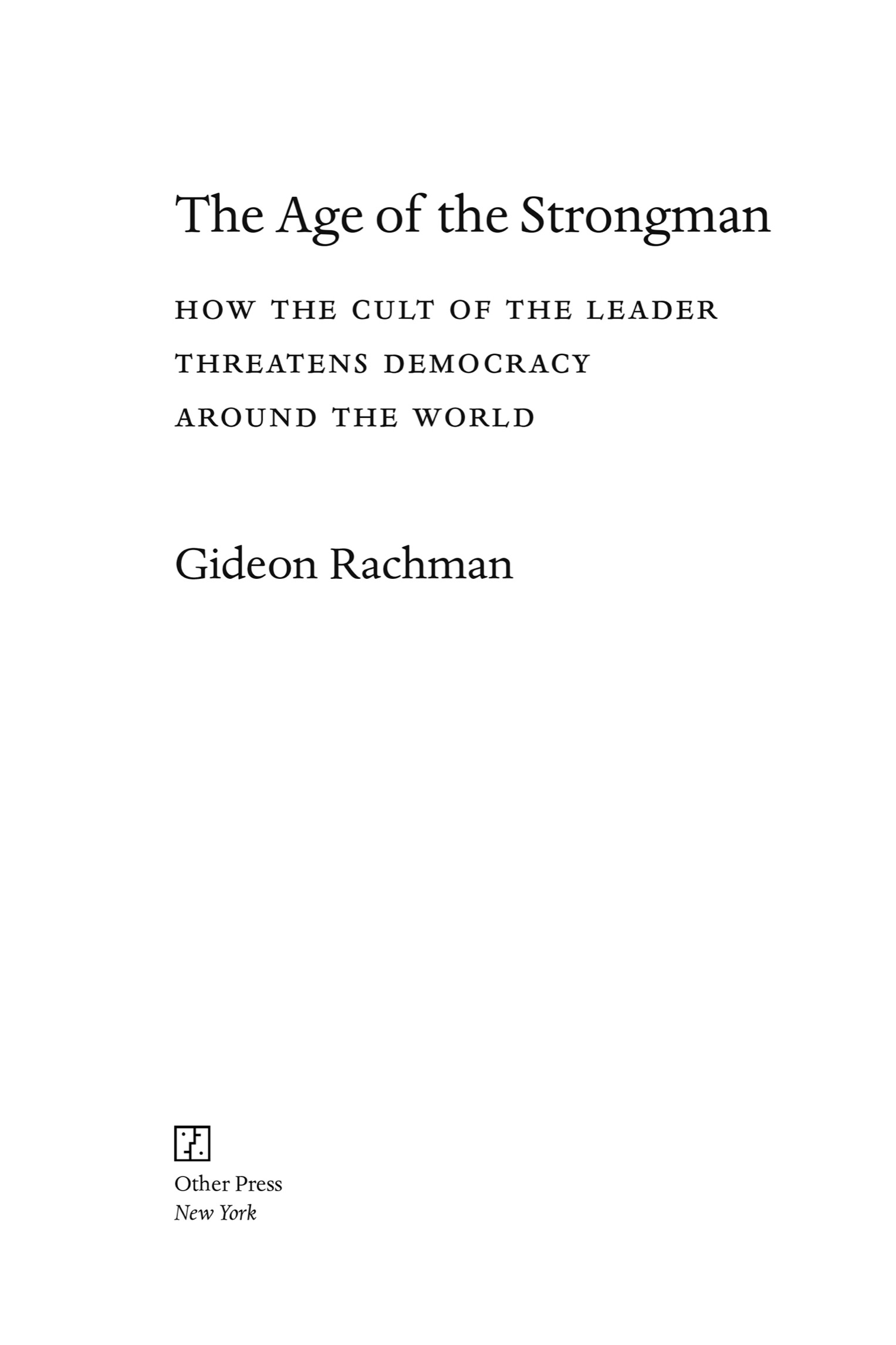Praise for
The Age of the Strongman
In telling us about strongmen who dominate politics around the world, Gideon Rachman paints a picture that is at turns illuminating and terrifying. A must-read.
Peter Frankopan, author of The Silk Roads: A New History of the World
Drawing on a wide range of sources, and providing a truly global perspective, Rachman illuminates the common instincts, tactics, and behavior that link leaders as diverse as Trump, Putin, Xi, and Modi.
Anne Applebaum, author of Twilight of Democracy
To understand the chilling stakes of the global Great Game defining this centurythe battle between autocracies and democraciesyou need only turn to Rachmans magisterial and deftly written book.
Catherine Belton, author of Putins People: How the KGB Took Back Russia and Then Took On the West
It was not long ago that most commentators thought globalization had triumphed over nationalism and the world was heading towards some version of liberal democracy. Today, we are in the midst of a vigorous resurgence of nationalism led by authoritarian strongmen. This is partly because many people have failed to benefit from economic growth, and their aspirations have been dashed. But it is also because there is now a supply of powerful authoritarian, nationalist ideas. This readable book does an admirable job of providing the lay of the land and highlighting the importance of the battle of ideas for the future of our institutions and norms.
Daron Acemoglu, coauthor of Why Nations Fail and The Narrow Corridor
When it comes to making sense of todays world, Gideon Rachman is in a league of his own. He is sharp, original, and unsentimental. Where others see a new clash between democracy and authoritarianism, he describes the rise of strongman politics as a defining feature of both authoritarian regimes and many of the worlds largest democracies. And the bad news is that the global revolt against the separation of powers and liberal constitutionalism has good chances of succeeding.
Ivan Krastev, coauthor of The Light that Failed
A superb and scintillating portrait of leaders who have upended the smug consensus of globalization.
Shruti Kapila, author of Violent Fraternity: Indian Political Thought in the Global Age
An illuminating blend of dark warnings about the present and optimism that strongman rule can never prevail in the long term.
Kirkus Reviews
Also by Gideon Rachman
Easternization: Asias Rise and Americas Decline from Obama to Trump and Beyond
Zero-Sum Future: American Power in an Age of Anxiety
Copyright Gideon Rachman 2022
First published in 2022 by Bodley Head, an imprint of Vintage.
Vintage is part of the Penguin Random House group of companies.
Production editor: Yvonne E. Crdenas
All rights reserved. No part of this publication may be reproduced or transmitted in any form or by any means, electronic or mechanical, including photocopying, recording, or by any information storage and retrieval system, without written permission from Other Press LLC, except in the case of brief quotations in reviews for inclusion in a magazine, newspaper, or broadcast. For information write to Other Press LLC, 267 Fifth Avenue, 6th Floor, New York, NY 10016. Or visit our Web site: www.otherpress.com
The Library of Congress has cataloged the printed edition as follows:
Names: Rachman, Gideon, author.
Title: The age of the strongman : how the cult of the leader threatens democracy around the world / Gideon Rachman.
Description: New York : Other Press, 2022. | Originally published: London : The Bodley Head, 2021.
Identifiers: LCCN 2021052765 (print) | LCCN 2021052766 (ebook) | ISBN 9781635422801 (hardcover) | ISBN 9781635422818 (ebook)
Subjects: LCSH: Authoritarianism. | Heads of stateBiography. | Charisma (Personality trait)Political aspects. | World politics21st century.
Classification: LCC JC480 .R34 2022 (print) | LCC JC480 (ebook) | DDC 320.53dc23/eng/20211210
LC record available at https://lccn.loc.gov/2021052765
LC ebook record available at https://lccn.loc.gov/2021052766
Ebook ISBN9781635422818
a_prh_6.0_139683233_c0_r0
In memory of Jack Rachman (19382021)
Introduction
In the spring of 2018, the White House was preparing for a summit between Donald Trump and Kim Jong-un. In the Old Executive Office Building, where the US presidents national security staff work, one of Trumps aides remarked to me, with a slightly sheepish smile: The president enjoys dealing face-to-face with authoritarian leaders.
It was clear that Trumps fondness for dictators made even some of his senior staff squirm. The unspoken thought, left hanging in the White House air, was that Trump himself had introduced some of the habits of a dictatorship into the heart of the worlds greatest democracy. The presidents wild rhetoric, his fondness for military parades, his tolerance for conflicts of interest and intolerance for journalists and judges are all features of the strongman style in politics a style that, until recently, was thought to be alien to the mature democracies of the West.
But Trump was in tune with his times. Since 2000 the rise of the strongman leader has become a central feature of global politics. In capitals as diverse as Moscow, Beijing, Delhi, Ankara, Budapest, Warsaw, Manila, Riyadh and Brasilia, self-styled strongmen (and, so far, they are all men) have risen to power.
Typically, these leaders are nationalists and cultural conservatives, with little tolerance for minorities, dissent or the interests of foreigners. At home, they claim to be standing up for the common man against the globalist elites. Overseas, they posture as the embodiment of their nations. And, everywhere they go, they encourage a cult of personality.
The Age of the Strongman began long before Trump won the White House. It will continue to be a central theme of world politics in the post-Trump era. The two emerging superpowers of the twenty-first century, China and India, have both fallen prey to strongman politics. Although they operate in very different political systems, Xi Jinping and Narendra Modi have led their countries towards a more personalized style of leadership that embraces nationalism, a rhetoric of strength and a fierce hostility to liberalism. The two most important powers on the eastern borders of the European Union, Russia and Turkey, are run by strongman leaders. Both Vladimir Putin and Recep Tayyip Erdoan have now been in power for the best part of twenty years. The strongman style has entered the EU itself through Hungarys Viktor Orbn and Polands Jaroslaw Kaczynski. Even Britains Boris Johnson has flirted with this style of politics in his attitudes to law, diplomacy and dissent within his own party. Latin Americas two largest countries, Brazil and Mexico, are currently led by Jair Bolsonaro and Andrs Manuel Lpez Obrador (popularly known as Amlo). Bolsonaro is on the far right; Amlo is on the populist left. But both leaders fit the strongman template, encouraging a cult of personality and contempt for state institutions.

